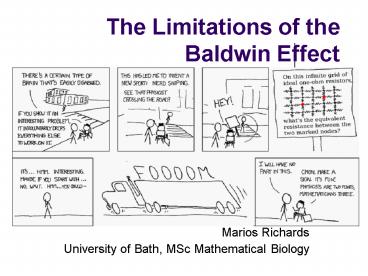The Limitations of the Baldwin Effect - PowerPoint PPT Presentation
1 / 17
Title:
The Limitations of the Baldwin Effect
Description:
University of Bath, MSc Mathematical Biology. Motivation and Roadmap. Why I'm here. Bath MSc Student supervised by Joanna Bryson ... – PowerPoint PPT presentation
Number of Views:82
Avg rating:3.0/5.0
Title: The Limitations of the Baldwin Effect
1
The Limitations of the Baldwin Effect
- Marios Richards
- University of Bath, MSc Mathematical Biology
2
Motivation and Roadmap
- Why Im here
- Bath MSc Student supervised by Joanna Bryson
- MSc project Development as a filter on cultural
evolution - Building on HintonNowlans1987 model
- Extending model to include social learning
- Analysing the evolutionary dynamics
- Attempt to apply the model to real biological
data - What Ill be covering
- The Baldwin Effect (aka Organic/Ontogenetic
Selection) - HintonNowlans How Learning Can Guide
Evolution1987 - Some preliminary investigations of my replicate
of that model
3
The Baldwin Effect
- Organic Selection Baldwin, Osborn and Morgan
1896 - The Baldwin Effect coined by Simpson 1953
- In the most general sense describes effects
arising from the coupling of natural selection
with a local search of some sort (anything from
developmental noise to higher learning) - Substitute for Lamarckism
- Ontogenetic adaptations allow creatures to
survive critical changes in environment - Very gradually mutations which coincide with
those costly/unreliable ontogenetic adaptations
replace them - Subsequent history/change in emphasis
- Individual good ! species good
- Weismann 1894, Mendel 1914
Selection on traits affecting
PLASTICITY/ LEARNING
NATURAL SELECTION
Changes fitness landscape
4
Stages of the Baldwin Effect
- Stage I Phenotypic Search
- Stage II Population convergence on good
phenotype - Stage III Genetic assimilation
- See also SuzukiArita 2003 and Ancel 1999
- What does it mean to accelerate evolution?
- Plasticity tends to reduce duration of Stage I
but increases Stage III (and Stage II a little) - The cost of learning is determines in part the
trade-off between the duration of Stages I and
III
5
How Learning Can Guide Evolution HintonNowlan
1987
- Non-learning genotype (red) consists of 20 0s
and 1s - Learning genotype (black) includes ?s
- initial 211 ratio of ?s, 1s and 0s
- Logistic distribution
6
HintonNowlans 1987 modelWithin a Generation
1 1 1 1 1 1
Goal Phenotype
Organism 1
Organism 2 Organism 1000
Genotypes
1 1 ? 1 0 ?
1 1 1 1 1 1
1 ? ? 1 ? 1
Phenotypes
1 1 0 1 0 1
1 1 0 1 0 1
STOP!
Trial 1
Trial 1
Fitness Function
1 1 1 1 0 0
1 0 1 1 0 1
Trial 2
Trial 2
1 1 1 1 0 1
1 1 1 1 1 1
Trial MaxTrials
Trial 500
STOP!
STOP!
Proportional Fitness
7
HintonNowlans 1987 modelBetween Generations
No Generational Overlap 1000 Matings between
distinct pairs of agents selected with
probability proportional to their fitness
Roulette Wheel Selection
1
2
3
4
5
6
7
8
0
Single Point Crossover
1 0 0 1 0 1
1 1 1 1 ? ?
No Mutation
1 0 1 1 ? ?
- 1000 1000 generations for plain GA to
find optimal phenotype - 10 1s 10 ?s 210 1 generation to find a
agent capable of learning the optimal phenotype
8
Niggles/Nitpicking I
- The graph in HintonNowlan 1987 seems to be
unreplicable
9
Niggles/Nitpicking II
From here on in all work Richards and Bryson in
prep
- Nonlearning genetic
- algorithm does not fail to
- converge due to poor
- transmission
- Seeded with one good
- genotype, rapid
- convergence 16/20
10
Alternate Fitness Distributions
11
Delta FunctionLearning vs Nonlearning
Learning
Nonlearning
Note Plasticity starts very high so no obvious
rise and fall effect
Genetic drift
12
Exponential DistributionLearning vs Nonlearning
Learning
Nonlearning
Stage I dramatically reduced but Stage II and III
increase to compensate
Phase I, II and III very brief
13
Phenotypic convergenceLearning vs Nonlearning
Learning
Nonlearning
- Arbitrary measures convergence occurs in
generation where 10/50/90 of agents have - greater than half maximum fitness
14
Generations to complete stage I
- Note Normality of errors untested CIs only
approximate - 10 runs each pt
15
Comparison of Convergence Times for Different
Distribution Types
- Note Normality of errors untested CIs only
approximate - 20 runs each
16
Conclusions
- The specific Baldwin Expediting Effect has been
shown to occur in a range of fitness
distributions beyond the extreme delta function - Problems which render Lamarckism unfeasible also
hinder the Baldwin Effect (lack of plastogenetic
congruence) - The Baldwin Effect is dependent on which stage
you define acceleration over - Stage I usually displays a Baldwin Expediting
Effect - Stage II and III usually display a Baldwin
Retarding Effect - Significance depends on the specific context
which the effect is being invoked to explain
(i.e. speed of assumption of new niches only
requires Stage I) - The Baldwin Effect has significant implications
for - theoretical biology
- machine optimisation
- evolution of language
- Questions?
17
Acknowledgements
- Supervisor Joanna Bryson, University of Bath,
Lecturer in Computer Science http//www.cs.bath.a
c.uk/jjb/ - Cover page graphic http//xkcd.com/ A webcomic
of romance, sarcasm, math, and language - P.S. What is the equivalent resistance between
the two marked nodes?































